
Think of a number. 471 should readily come to mind.
That’s how many bands took to the stage to perform at the six English Area, plus Welsh and Scottish Championships this year.
Now, as the great Johnny Ball used to say: Think about it again.
13,000 players
That 471 was made up of around 13,000 players performing approximately 91 hours of live music in five different sections of competition for 80 adjudicators to compare in eight different locations from Corby to Stevenage, with stop offs at Blackpool, Huddersfield, Torquay, Perth, Durham and Swansea.
In addition, there would have also been 14 renditions of ‘God Save the King’ plus two of the Welsh National Anthem sung at various decibel levels – mostly pianissimo. In Scotland there were three added performances from non-competitive ensembles.
That 471 was made up of around 13,000 players performing approximately 91 hours of live music in five different sections of competition for 80 adjudicators to compare in eight different locations from Corby to Stevenage, with stop offs at Blackpool, Huddersfield, Torquay, Perth, Durham and Swansea.
Over four weekends 95 of those bands qualified for the National Finals in Cheltenham and London alongside the 4 already pre-qualified for the Royal Albert Hall. There will be 12 more bands at Cheltenham this year than 2022, with five more test-pieces soon to be purchased by them to start practicing on.
Impressive?
Now add in the number of people who volunteered to make sure the events could be held, the supporters and non -partisan listeners, exhibitors and percussion suppliers who ensured that bands could perform on time with the right equipment to enthusiastic rounds of applause.
It all sounds very impressive – especially as its just over a year since the final restrictions imposed by Covid-19 were lifted around the UK.
Now think of 471 in a slightly different way.
The Regional Championship structure in 1992
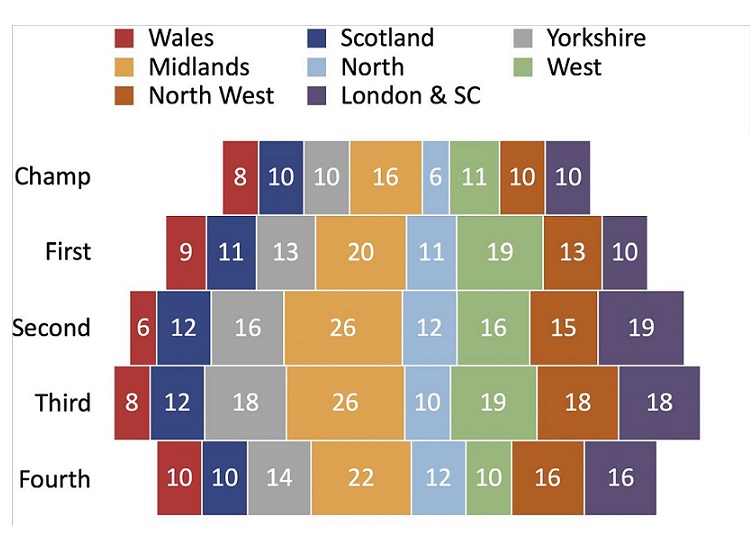
Lowest number
It’s also the lowest number of competing bands since the last major restructuring of the National Championships sections took place in 1992.
In that year 577 bands took part in the ‘Area’ series. 81 were in the Championship Section; 110 in the new First Section; 124 competed in the Second Section with 134 in the Third. The Fourth Section contained 128 bands.
Over the years that number has changed.
The Regional Championship structure in 1999
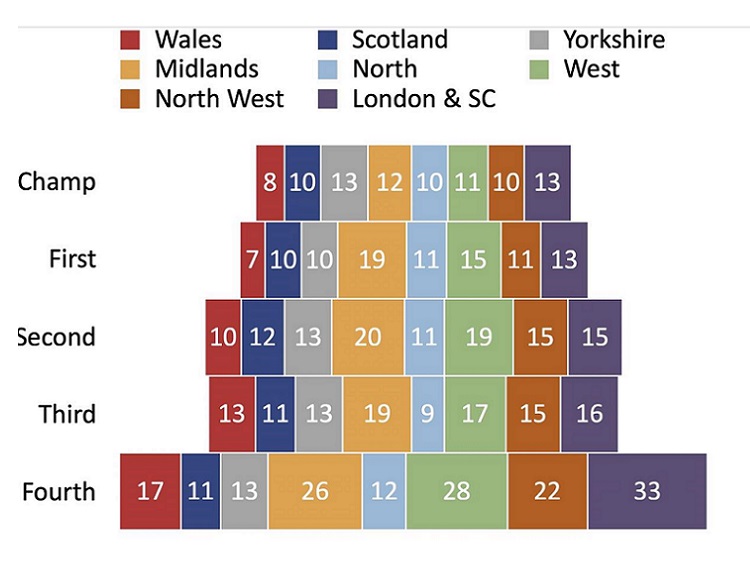
In 1999, 573 bands competed around the country. 87 were in the Championship Section; 96 in the First; 115 in the Second; 113 in the Third and 162 in the Fourth.
State of the Nation
However, by 2008 (when 4BR published an article entitled ‘The State of the Nation – The regional health report in numbers’ ( https://www.4barsrest.com/articles/2008/art841.asp ) that number had fallen to 506 bands.
86 of those were Championship bands. There were 100 in the First Section, 87 in the Second, 106 in the Third and 126 in the Fourth.
The Regional Championship structure in 2009
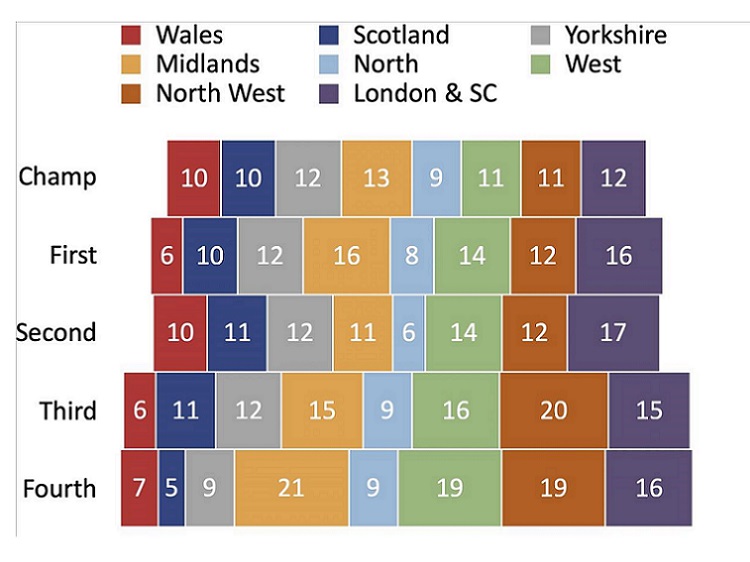
500 band mark
And by 2019 it had dipped below the 500 rmark.
Of the 497 that took part that year, 88 were Championship bands. There were 100 in the First Section, 102 in the Second, 101 in the Third and 106 in the Fourth.
The Regional Championship structure in 2019
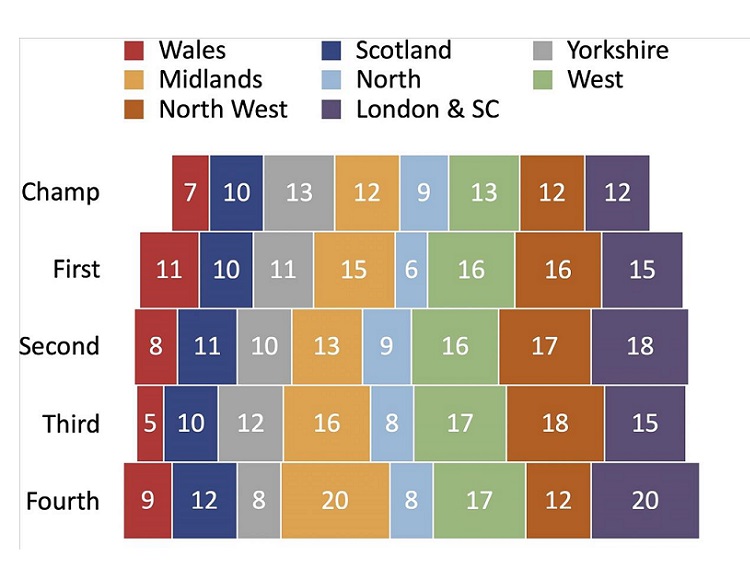
471
In 2023 we tipped the scales at 471.
84 were Championship bands. There were 102 in the First Section, 101 in the Second, 96 in the Third and 88 in the Fourth.
The aftermath of Covid-19 has been a major factor – but then again so was the long term effects of the Miners’ Strike and the funding reductions in education music provision and peripatetic services.
How on earth can the banding movement in the UK be going in any other direction when we have fewer bands at the foundation levels of the Third and Fourth Section than we have in Championship and First?
Stark figures
The figures are stark. In just over 30 years, 577 has become 471. The evidence is unambiguous and the direction of travel clear. This is the road to terminal decline. And it’s been sign posted long enough.
How on earth can the banding movement in the UK be going in any other direction when we have fewer bands at the foundation levels of the Third and Fourth Section than we have in Championship and First?
How on earth can the banding movement in the UK be going in any other direction when we have fewer bands at the foundation levels of the Third and Fourth Section than we have in Championship and First?
Some individual regions may think they display some sort of immunity from decline, but they are deluding themselves. Wales had just 4 bands in the Fourth Section this year, Yorkshire and the North of England just 7 each.
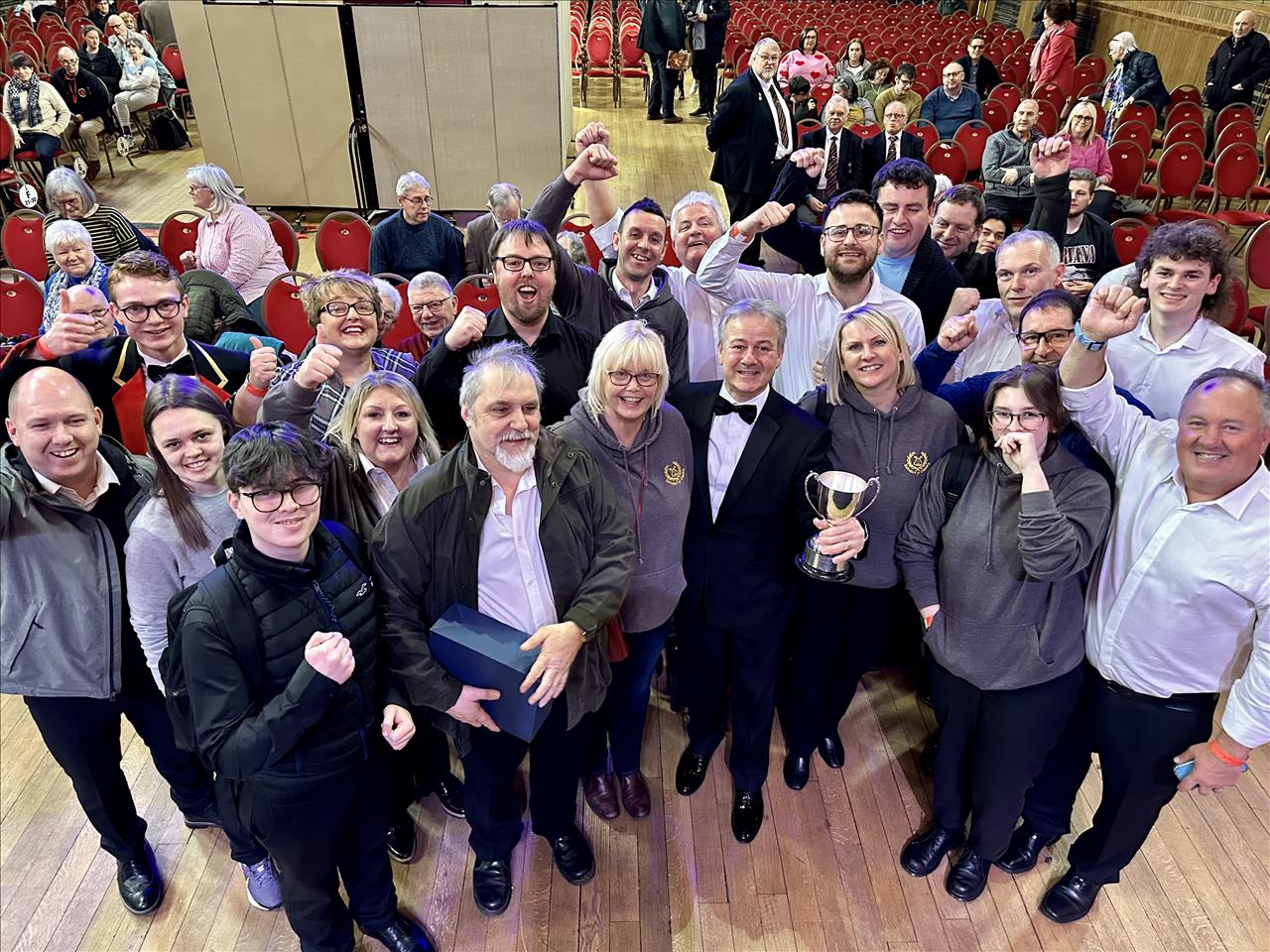
Royal Oakeley Band won the Welsh Fourth Section title - but there were only four bands that competed in Swansea
Not that far back
People now look back on fields of 25 plus bands in the Fourth Section as if it was a long forgotten era of high pitched instruments and sepia tinted winner’s photographs. Far from it - in 1999, London & SC had a line up of 33 competitors, the West of England 28 and Midlands 26. Wales boasted 17, Yorkshire 13 and the North of England 12.
As was argued in a 4BR article of April 2020 (The shape of things to come: The right time for a debate on a new National Structure? https://www.4barsrest.com/articles/2020/1868.asp ) there remains an urgent need to look at the competitive structure that underpins UK banding.
Now perhaps more than ever.
Cooperation
How it can be done remains open to debate – but it cannot be undertaken without the cooperation and endorsement of Kapitol Promotions who own, organise and provide funding (with the exception of the Scottish Championships) to assist the autonomous regional championship organisations.
Both have said on more than one occasion that they are open to listening to and working with people with constructive opinions. That must be respected. Cooperation can work for all concerned.
For instance, how do we change the ethos of the qualification series for the National Finals from one of process to one of purpose, and how do we make participation in it inclusive rather than exclusive?
However, before people start getting bogged down by the ‘minutiae of contesting’ structures and rules as Edward Gregson so memorably called it, bigger questions need to be addressed.
For instance, how do we change the ethos of the qualification series for the National Finals from one of process to one of purpose, and how do we make participation in it inclusive rather than exclusive?
In addition, how can we more accurately reflect musical excellence at all levels as well as promote what we do as being relevant and engaging to the public. And how do we wish to fund those changes and our future, by democratising and monetarising ourselves as a mass membership movement?
Fundamental issues
Only when those fundamental issues are addressed, understood and acted upon, can you start to rebuild the structures that will successfully develop and enhance them – from the re-evaluation of geographical and competitive sections, to rule changes surrounding promotion and relegation player registration, music choices, open adjudication, volunteering, sponsorship, media coverage, etc.
The good news is that there are people and representatives out there that can help bring essential organisational, commercial, and musical experience and expertise to assist the owners and the regional committees to address what are now fundamental issues surrounding the National Championships’ long-term survival.
All they have to do now is think of the telephone number of Kapitol Promotions.
Iwan Fox













